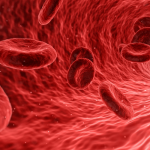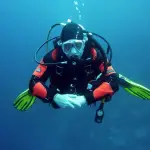
Scuba diving can potentially pose some challenges for individuals with pre-existing heart conditions or certain risk factors. The physiological effects of scuba diving, such as increased pressure, gas absorption, and changes in heart rate, can put stress on the cardiovascular system.
However, for most healthy individuals, scuba diving is generally considered a safe activity.
During a dive, the increased pressure can affect the circulatory system by causing blood vessels to constrict, increasing the workload on the heart. Additionally, breathing compressed air underwater can lead to an increased heart rate. These factors can potentially affect individuals with heart conditions or those at risk for cardiovascular problems.
It is essential to note that scuba diving organisations, such as the Professional Association of Diving Instructors (PADI), have medical questionnaires and guidelines in place to assess an individual’s fitness for diving.
Before engaging in scuba diving or any strenuous physical activity, it is recommended to consult with a healthcare professional, particularly if you have a history of heart conditions or any concerns about your cardiovascular health. They can provide you with personalised advice based on your specific medical history and current health status.
Can scuba diving cause heart problems?
Scuba diving itself does not typically cause heart problems in healthy individuals. However, there are certain circumstances where scuba diving can potentially contribute to or exacerbate pre-existing heart conditions or lead to complications in susceptible individuals.
Here are some scenarios where scuba diving can be a concern for individuals with heart problems:
- Cardiac conditions: Individuals with certain heart conditions, such as coronary artery disease, congestive heart failure, or a history of heart attacks, may have reduced tolerance to the physical stress of scuba diving. The increased workload on the heart, changes in blood pressure, and potential oxygen toxicity can pose risks in these cases.
- Arrhythmias: Individuals with certain types of arrhythmias, such as unstable or poorly controlled irregular heart rhythms, may be at risk during scuba diving due to the physical exertion and the potential for stress on the heart.
- Pulmonary edema: Pulmonary edema, a condition where fluid accumulates in the lungs, can be exacerbated by the increased pressure experienced during scuba diving. This condition can strain the heart and compromise its function.
- Patent foramen ovale (PFO): A patent foramen ovale is a common congenital heart defect where there is a small hole in the wall between the heart’s chambers. It is usually harmless, but in some cases, it can allow bubbles to pass from the right side of the heart to the left during a scuba dive. This can potentially lead to decompression sickness, which can include symptoms such as chest pain, shortness of breath, and neurological issues.
To ensure safety, scuba diving organisations have medical questionnaires and guidelines in place to assess an individual’s fitness for diving.
It is crucial to provide accurate information and consult with a healthcare professional if you have a history of heart conditions or concerns about your cardiovascular health before engaging in scuba diving. They can provide personalised advice based on your specific medical history and current health status.
If you may be interested to learn more about liveaboard diving boats as a way to enjoy diving and to get more diving experience. If you are please take a look at the following window:
Is scuba diving good for the heart?
Scuba diving can have certain benefits for the cardiovascular system when practiced by healthy individuals.
Here are some potential positive effects of scuba diving on the heart:
- Physical exercise: Scuba diving involves physical activity such as swimming against resistance and carrying equipment, which can contribute to cardiovascular fitness. Regular exercise is generally beneficial for the heart, improving cardiovascular endurance, strength, and overall cardiovascular health.
- Reduced stress levels: Engaging in recreational activities like scuba diving can help reduce stress levels, and chronic stress is known to have negative effects on the cardiovascular system. By providing an opportunity for relaxation, enjoyment, and connection with nature, scuba diving can contribute to improved mental well-being, which indirectly benefits heart health.
- Enhanced circulation: The increased pressure experienced during scuba diving can promote better blood circulation. The pressure can help improve the efficiency of blood flow, enhance oxygen delivery to tissues, and assist in clearing waste products. Improved circulation can have positive effects on overall cardiovascular health.
- Diving as a motivator for a healthy lifestyle: Scuba diving often involves adopting a healthy lifestyle, such as maintaining physical fitness, managing body weight, and avoiding smoking. These lifestyle factors are known to have a positive impact on heart health.
It’s important to note that while scuba diving can have potential benefits for the heart, it is not a substitute for proper medical care or lifestyle modifications recommended by healthcare professionals.
It’s always advisable to consult with a healthcare provider before engaging in scuba diving or any strenuous physical activity, especially if you have pre-existing heart conditions or concerns about your cardiovascular health. They can provide personalised advice based on your individual health status.
Is diving bad for the heart?
Diving itself is not inherently bad for the heart. However, certain conditions or circumstances related to diving can pose risks for individuals with pre-existing heart conditions or certain cardiovascular factors. Here are a few considerations:
- Cardiovascular Strain: Diving places additional physiological stress on the body, particularly on the cardiovascular system. The physical exertion, immersion, and pressure changes during diving can increase heart rate and blood pressure. For individuals with underlying heart conditions, such as coronary artery disease, arrhythmias, or heart failure, this increased strain may be problematic and could potentially lead to cardiovascular events.
- Gas Toxicity: Some gases used in diving, such as high-pressure oxygen, can be toxic to the body, particularly if breathed in at depth or for prolonged periods. Oxygen toxicity can have adverse effects on the heart and the central nervous system. Divers with specific heart conditions or taking medications that interact with oxygen should be cautious and consult with a medical professional.
- Decompression Stress: The process of ascending from a dive involves managing decompression stress caused by the release of dissolved gases, primarily nitrogen, from the body’s tissues. Individuals with certain heart conditions or compromised circulation may be more susceptible to the effects of decompression stress, potentially increasing the risk of decompression sickness or arterial gas embolism.
It is crucial for individuals with existing heart conditions or cardiovascular risk factors to consult with a physician experienced in diving medicine before participating in scuba diving or other diving activities. A thorough evaluation of cardiac health, along with an assessment of the individual’s ability to handle the physical demands of diving, can help determine their suitability for diving and any necessary precautions or restrictions.
Remember that diving safety is a complex matter, and individual circumstances can greatly influence the risks involved. Seeking guidance from a medical professional trained in diving medicine will provide the most accurate and personalised advice based on your specific health condition.
What effect does diving have on heart rate?
Diving can have an impact on heart rate due to several factors associated with the activity.
Here are a few ways in which diving can affect heart rate:
- Increased workload during physical exertion: Diving involves physical exertion, such as swimming, carrying equipment, and dealing with underwater currents. These activities require the body to work harder, which can result in an elevated heart rate. The level of exertion and the intensity of the dive can influence the degree of increase in heart rate.
- Dive reflex: When the face comes into contact with cold water, it can trigger the dive reflex. The dive reflex is a natural response that causes the heart rate to decrease, peripheral blood vessels to constrict, and blood to be redirected to vital organs. This reflex can temporarily lower heart rate and conserve oxygen while diving, particularly during facial immersion.
- Stress response: Scuba diving can be an exciting and challenging activity, especially for beginners or in certain diving conditions. This can lead to an increase in heart rate as part of the body’s stress response. The anticipation, excitement, or occasional anxiety associated with diving may cause a temporary elevation in heart rate.
- Gas density and composition: Breathing compressed air or other gas mixtures while diving can influence heart rate. The higher density of the inhaled gas under pressure can lead to increased respiratory effort, which can elevate heart rate. Additionally, breathing mixtures with higher oxygen content can stimulate the sympathetic nervous system, potentially resulting in an increased heart rate.
It’s important to note that individual responses to diving-related factors can vary. The impact on heart rate during diving will depend on factors such as individual fitness, experience level, diving conditions, and equipment used. Monitoring heart rate during dives can provide valuable information about physiological responses and exertion levels.
Can I scuba dive with heart palpitations?
Scuba diving with heart palpitations is generally not recommended, as it can pose risks to your safety and health.
Heart palpitations are abnormal sensations of a rapid, irregular, or pounding heartbeat, and they can be a symptom of an underlying heart condition or other health issues.
Here’s why scuba diving with heart palpitations is generally discouraged:
- Increased cardiovascular demands: Scuba diving requires physical exertion, and the underwater environment can place additional stress on the cardiovascular system. If you already have an underlying heart condition or are experiencing heart palpitations, the increased workload on the heart during diving can potentially worsen the condition or trigger more severe palpitations.
- Risk of arrhythmias: Scuba diving can potentially trigger or exacerbate cardiac arrhythmias, including those causing palpitations. The changes in pressure, physical exertion, and potential stress or anxiety associated with diving can disrupt the heart’s electrical system and lead to abnormal heart rhythms.
- Decreased awareness and potential hazards: When diving, it is crucial to maintain awareness of your surroundings, monitor equipment, and make critical decisions. Heart palpitations can distract your focus and impair your ability to respond effectively to potential hazards underwater, compromising your safety.
If you experience heart palpitations, it is important to consult with a healthcare professional to determine the underlying cause and receive appropriate evaluation and treatment.
They can provide guidance specific to your condition and advise whether scuba diving is safe for you. It is always better to prioritise your health and safety by ensuring you have medical clearance and appropriate management of your heart condition before considering scuba diving or any strenuous physical activity.
Can I scuba dive if I have atrial fibrillation?
Scuba diving with atrial fibrillation (AF) is generally not recommended due to the potential risks and complications associated with this condition. Atrial fibrillation is an irregular and often rapid heart rhythm that can increase the risk of blood clots, stroke, and other cardiovascular problems.
Here are some reasons why scuba diving with atrial fibrillation is discouraged:
- Risk of complications: Atrial fibrillation increases the risk of blood clots forming in the heart chambers, particularly in the left atrial appendage. Scuba diving involves changes in pressure, physical exertion, and potential stress, which can increase the risk of dislodging a blood clot and triggering a stroke or other serious complications.
- Decreased awareness and potential hazards: Scuba diving requires maintaining situational awareness, monitoring equipment, and responding to potential hazards underwater. Atrial fibrillation can cause symptoms such as palpitations, dizziness, or shortness of breath, which can affect your ability to dive safely and respond appropriately to potential emergencies.
- Medications and their effects: Many individuals with atrial fibrillation take anticoagulant medications, such as blood thinners, to reduce the risk of blood clots. These medications can increase the risk of bleeding, which may be exacerbated by the physical demands and potential risks associated with scuba diving.
It is essential to consult with your healthcare professional regarding scuba diving if you have atrial fibrillation. They can provide personalised advice based on your specific medical history, current condition, and overall health status. In most cases, individuals with atrial fibrillation are advised to avoid scuba diving due to the potential risks involved.
Other alternative water activities that do not involve changes in pressure and physical exertion may be considered instead.
Is it safe to scuba dive while taking blood thinners?
Scuba diving while taking blood thinners, such as anticoagulant medications, is generally not recommended due to the potential risks involved.
Anticoagulants help prevent blood clots by inhibiting the clotting process, but they also increase the risk of bleeding.
Here’s why scuba diving while on blood thinners is discouraged:
- Risk of bleeding: Scuba diving involves physical activity, changes in pressure, and potential hazards. These factors can increase the risk of injury, which may lead to bleeding. Taking blood thinners can further impair the blood’s ability to clot, potentially resulting in excessive bleeding in case of an injury.
- Decompression sickness: Scuba diving involves changes in pressure as you descend and ascend. Decompression sickness (DCS), also known as “the bends,” is a condition that can occur if a diver ascends too quickly, causing nitrogen bubbles to form in the body’s tissues and bloodstream. While there is no direct evidence linking blood thinners to an increased risk of DCS, the potential for bleeding complications associated with blood thinners may complicate the management of DCS if it were to occur.
- Limited research and guidelines: There is limited scientific research specifically addressing the safety of scuba diving while on blood thinners. Due to this lack of evidence and the potential risks involved, most scuba diving organisations and medical experts advise against diving while taking blood thinners.
If you are taking blood thinners and considering scuba diving, it is essential to consult with your healthcare professional.
They can assess your individual situation, evaluate the risks, and provide specific guidance based on your medical history, the specific anticoagulant you are taking, and the purpose for which you are taking it. They may suggest alternative water activities or provide recommendations to ensure your safety while still enjoying aquatic environments.
I hope you enjoyed this article about is scuba diving hard on the heart?
I’d love to hear from you. Tell us about your adventures of diving and snorkelling. Please use the comments section below. Please also share your photos. Either from your underwater cameras or videos from your waterproof go-pro’s!
If this article hasn’t answered all of your questions. If you have more questions either about snorkelling or scuba diving (or specifically about is scuba diving hard on the heart), please comment below with your questions.
There will also be many more articles about scuba and scuba diving safety tips (and on snorkelling too) for you to read and learn about this fabulous sport.
Have fun and be safe!




